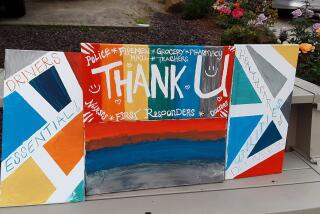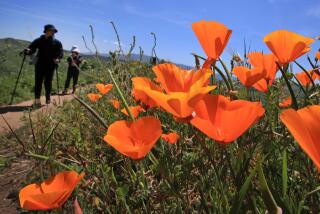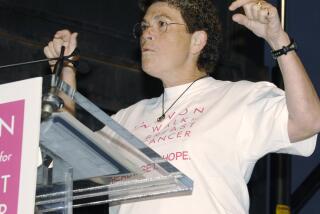Thanks to Them
- Share via
It happens in a flash, an instant. Suddenly lives are changed for the better.
Millions of ordinary Americans, usually with little or no recognition or praise, offer extraordinary time to try to improve their world. But their path to good deeds often starts with halting, quirky steps: a debilitating illness and a prayer. A spanking in a youth center. The speech of a nun. A chance meeting at sea with dolphins.
No matter how they decide to do what they do, however, their efforts can by quietly moving: lonely seniors are no longer neglected; high-risk teen-agers get attention from a self-described former tough; crime victims receive some care and attention that the system never could give.
For all the labor, the hard work of all too many largely goes unsung. On a day of thanksgiving, it’s worth telling some of the tales of kindness.
Here are a few:
Kathryn Himmelsbach Himmelsbach, a 75-year-old retired psychiatric social worker and a pioneer in developing group therapy for cancer families, helps run the Washington, D.C., chapter of the American Cancer Society. “Even as a small child, I’d had a feeling for other people, possibly as the result of being an only child and receiving so much love. That was what drew me to social work. Early in my career I helped develop a psychiatric clinic in Ft. Lauderdale for four years. I was working exclusively with psychiatric patients. Then my husband, Jim, died of cancer when we were both quite young. He became more and more ill and died at Walter Reed Hospital, which brought us back home to the Washington area, where I had grown up. I had one little girl who was then 8, and we went through all his cancer treatment and the stress this engenders.
“His cancer was very stressful to all of us. But I’ve always felt I was a strong person. And my decision to place my emphasis on working with cancer patients and their families was even stronger because I had a child. It behooved me to be a role model for her. I think I did that as well as you can, although no one can make up for the loss of a parent.
“But at any rate, my decision to work with cancer families did help my daughter go through this. After Jim’s death I looked at various job opportunities. But when the National Institutes of Health offered me a job as director of social work at the National Cancer Institute, I said, ‘I’ve never worked with cancer patients.’ But I told them about Jim. And they asked if it would bother me, and I said, ‘I don’t think so. Certainly it has deepened some of my understanding of what people go through. And I’d like to try it.’ So I tried it, and I liked it!
“And the thing that’s always impressed me so is that illness is such a leveler. It gives us what we should have already but don’t, which is a keen sense of humanity and the importance of each person. There are many gratifications. Often after a hard day at work I really felt almost as if I should pay them. “


